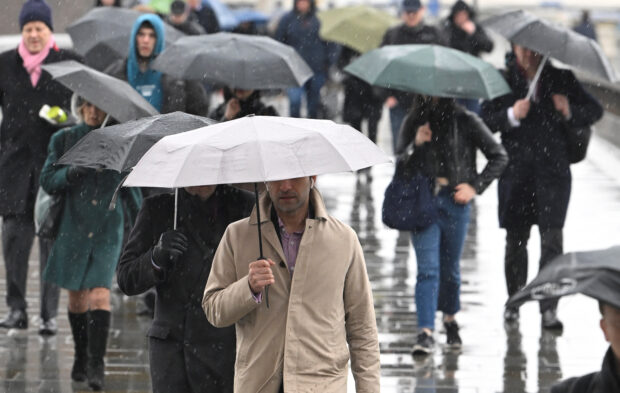
Workers cross London Bridge during the morning rush hour in London, Britain, March 10, 2023. REUTERS/Toby Melville/File photo
LONDON – Growth in pay in Britain – which the Bank of England is watching closely as it weighs up whether to pause its run of interest rate hikes next week – lost pace in the three months to January, official data showed on Tuesday.
Basic pay, excluding bonuses, rose by 6.5 percent compared with 6.7 percent in the three months to December.
Total pay grew by an annual 5.7 percent in the November-to-January period, slowing from 6 percent in the previous figures, the Office for National Statistics said.
Economists polled by Reuters had expected basic and total earnings to rise by 6.6 percent and 5.7 percent respectively.
Britain’s unemployment rate held at 3.7 percent in the three months to January, close to its lowest in almost five decades, the data also showed.
Economists polled by Reuters had mostly expected the rate to rise to 3.8 percent .
The BoE is expected to raise borrowing costs on March 23 by a further quarter of a percentage point to 4.25 percent although investors have cut their bets on such a move sharply after the collapse of U.S. lender Silicon Valley Bank.
Interest rate futures showed investors were putting the chance of the BoE pausing its rate hikes next week at about 40 percent at 0815 GMT while a quarter of a percentage point increase in borrowing costs was seen as a 60 percent possibility.
Yael Selfin, chief economist at KPMG UK, said while the ONS data showed a slowing of pay growth, more recent measures showed little change recently.
“Coupled with stronger-than-expected GDP data, this should provide enough evidence for the Bank to raise rates when it meets next week,” Selfin said.
Samuel Tombs, at consultancy Pantheon Macroeconomics, said the wages figures strengthened the case for a BoE rates pause after 10 back-to-back hikes.
“Admittedly, labour market slack is increasing only gradually,” he said. “Nonetheless, surveys show recruitment difficulties are no more pronounced than in before the pandemic and redundancies look set to pick up over the coming months.”
Sterling rose against the dollar and the euro shortly after the data before falling back.
Finance minister Jeremy Hunt is expected to announce measures in his budget statement on Wednesday that will seek to get more people into work, easing the inflationary pressure in the labour market.
“The jobs market remains strong, but inflation remains too high,” finance minister Jeremy Hunt said after the data was published, a day ahead of his budget speech.
“Tomorrow at the budget, I will set out how we will go further to bear down on inflation, reduce debt and grow the economy, including by helping more people back into work.”
Tuesday’s data showed earnings were further diminished by an inflation rate that stood above 10 percent in January.
The ONS said basic pay, when adjusted for inflation using the consumer prices index, fell by 3.5 percent one of the largest falls since records began in 2001. Total pay fell by 4.4 percent in real terms, the biggest drop since early 2009.
There were some signs of a further easing of the tightness in the labour market with the economic inactivity rate – measuring people out of work and not looking for it – falling by 0.2 percentage points to 21.3 percent, driven mostly by young people.
Vacancies decreased for the eighth time in a row in the three months to February, falling by 51,000 from the previous three months to 1.124 million.
READ:
UK firms plan biggest pay rises since 2012 to fill staff gaps
UK pay settlements hit 6%, highest since 1991 – XpertHR